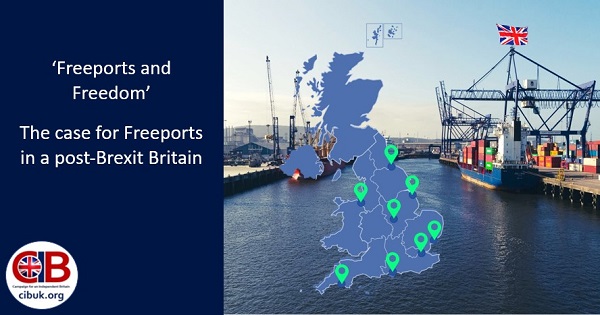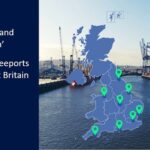The case for Freeports in a post-Brexit Britain

‘Freeports and Freedom.’
The case for Freeports in a post-Brexit Britain
The CIBUK Clear Water Partnership – News Bulletin
INTRODUCTION
We can finally bang the drum on behalf of Freeports across the whole of the United Kingdom after the announcement of the opening of two new ‘green’ ports in Scotland earlier this month. A stellar example of a post-Brexit benefit if ever there was one.
The policy has been a long time in the making. But like the proverbial avalanche, momentum is gathering with the prospect of unveiling two new ports at Cromarty Firth and Forth.
They join a growing list of port-locations around the rest of the UK including Teesside, Liverpool, Plymouth and Hull as well as shared freeports for Felixstowe and Harwich and Southampton and Portsmouth.
As the roll-out gathers pace and its implications sink in, one is struck by the huge potential opportunities this now affords the UK.
In this Bulletin Special on the ‘what, where and why?’ of Brexit Freeports, we are indebted to our affiliate BrexitFacts4EU for their in-depth research on the issue, and upon which the publication of this report is based.
Freeports – What, where why?
What are freeports?
“Freeports are defined areas where it is possible to import goods (typically at a seaport or airport) without paying any import duty or tax, use them in a manufacturing process, and then export the finished goods. They can extend up to 28 miles beyond the centre.
“They have precise geographical boundaries within which companies can operate on preferential tax terms, making inward investment attractive.”
Where and how many?
With the recent announcement from Scotland, the total number of Freeports across the UK now totals ten, with two north of the border and the remaining eight located across England from Plymouth and South Devon via the Solent, Tilbury, East Midlands airport to Liverpool and Humberside.
So far no ports have yet been approved in Wales – a decision involving both the Westminster government and the Welsh Assembly. However, an announcement is expected soon.
Why?
Because we can and because the future potential opportunities are so enormous. Freed (relatively) from the strictures of EU state-aid rules, the UK is now able to exercise its newly acquired freedoms by offering the kinds of incentives needed to get freeports off the ground and to give the UK economy the shot in the arm so many of us have been waiting for ever since we technically left the European Union three years ago .
We are therefore delighted at the scope and scale of the new Freeports legislation, tailored as it is to the needs of local and international businesses across a range of areas with vital incentives on planning, seed capital, tax reliefs and capital allowances.
With their wide geographical spread across the country, it is not surprising that Freeports are touted by the Government as part of the ‘levelling up’ agenda. Combined, the six fully operational Freeports are expected to generate millions of pounds in investment and thousands of highly skilled jobs, boosting local economies and benefitting the whole of the UK.
‘Bottom up’
Nonetheless, as economist and Brexiteer Professor Paul Ormerod argues in a related article from one of our affiliates, successful levelling up must be based on a ‘bottom-up’ rather than a ‘top-down’ approach, with investment decisions taking locally rather than centrally.
Targeted Investment
People talk lazily of ‘regional development’ but within the regions themselves huge disparities exist.
“So, in Greater Manchester, for example, the city centre has boomed. There is a further growth pole around the airport and neighbouring areas in the prosperous South West of the region. The boroughs in the North and East – Rochdale, Bury, Oldham and Tameside – lag behind.”
Any advantage accruing to the Freeports policy will rapidly evaporate unless it is very specifically targeted at the places which need it most. Operating within a 28-mile radius will provide some focus, but much greater scrutiny on how that money is allocated will be needed if past mistakes are not to be repeated.
Local Pride
Freeports are exemplars in this respect. Located in specific places, they can thrive under their own banner as beacons of excellence attracting further inward investment.
“A good example of this is Teesside, inspired by its Mayor, Ben Houchen. For many years, policy makers at a national level thought in terms of the “North East”. Here was a region of the UK which lagged behind and needed “regional policy” applied to lift it up.
But except in a rather amorphous sense, the North East is not the concept which attracts loyalty. It is Tyneside and Teesside, to name but two places in the region with which people readily identify.
Houchen has cemented this identity in his industrial policy. His brand “Net Zero Teesside” is brilliant. It tells investors almost everything they need to know about the types of companies the area already has and wants to attract more of. And it is a source of local pride.”
Wider Interest
Word is starting to get around. Professional services companies are beginning to weigh up the potential business opportunities. BDO (Binder Dijker Otte) is an international network of accounting, tax, consulting and business advisory firms and is already providing a dedicated service to potential Freeport investors on its website. Their outlook is bullish:
“The introduction of Freeports in the UK will create new opportunities, especially for businesses with an import/export orientation. In reality, businesses across shipping, logistics, manufacturing, real estate and construction and many other industries will be able to take advantage of the new regulations and incentives. By boosting trade, jobs, and investment across a number of sites, Freeports can also become hotbeds for innovative companies..”
(Michael Simms – Partner)
Will this usher in a stampede of investors? Only time will tell.
CONCLUSION
Be in no doubt, the scale of what is being contemplated here is quite beyond anything the UK might have considered had it still been hibernating beneath the canopy of the European Union. Freed at last from the shadows of the EU, it can finally stretch its limbs and exercise its ingenuity in putting Freeports at the very heart of its post-Brexit vision.
Commenting on the new Green Ports announcement in Scotland, Secretary of State for Levelling Up Michael Gove outlined his vision in a letter to SNP Chair of the Scottish Affairs Committee Pete Wishart MP:
“The Inverness and Cromarty Firth, and the Firth of Forth are fantastic places for these new Green Freeports, ensuring the benefits are felt right across Scotland. I wish to share my congratulations with the successful locations. Their strong bids demonstrated how they will regenerate their local communities, deliver decarbonisation, establish hubs for global trade, and pioneer industries of the future.”
It is a vision we strongly endorse and one on which we will continue to campaign for the whole of the United Kingdom.
For further reading we enclose links to the full articles referred to in Bulletin:
The Freeport Brexit boom – the good news keeps quietly accumulating
Levelling Up in Brexit Britain
Please support our work today, to keep us going
Main image: montage CIBUK.Org




